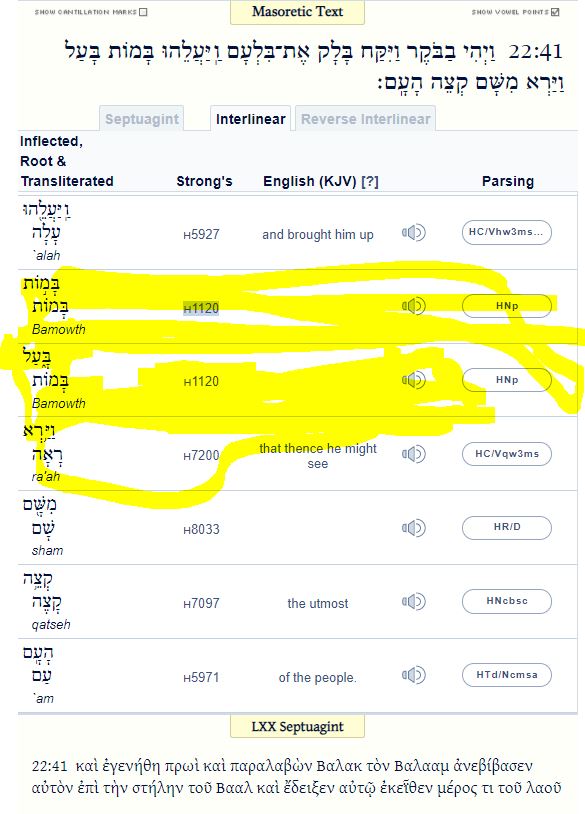In Numbers 22:41 : "Bamot" (בָּמ֣וֹת) = "[the] heights" is a term also found in Numbers 21:20 "And-from-[the] heights" (Umi-Bamot, וּמִבָּמ֗וֹת). "Bamot" (בָּמ֣וֹת) is the plural form of "Bamah" (בָּמָֽה) = "[the] High place" on which burnt offerings were sacrificed. - referenced in [1 Samuel 9:12]
- "Bamot" (בָּמ֣וֹת) does not always reference the Ba'al worship. * Yisraelites also used locations called "Ha-Bamah" ( הַבָּמָ֖ה ) = "The-High place" for their own burnt offerings (without the presence of idols) - referenced in [1 Samuel 9:25].
Ha-Bamah (הַבָּמָ֖ה) for Yisraelites would not have been a Ziggurat - since Ziggurat requires cut stones for its altar, which are banned for burnt offerings (on a singular high place) in [Deuteronomy 27:5-6]: [5] "And there, you shall build an altar to YHVH, your God, an altar of stones. You shall not wield any iron upon them." ( וּבָנִ֤יתָ שָּׁם֙ מִזְבֵּ֔חַ לַֽיהֹוָ֖ה אֱלֹהֶ֑יךָ מִזְבַּ֣ח אֲבָנִ֔ים לֹֽא־תָנִ֥יף עֲלֵיהֶ֖ם בַּרְזֶֽל )
[6] "You shall build the altar of YHVH, your God, out of whole stones. And on it, you shall offer up burnt offerings to YHVH, your God." ( אֲבָנִ֤ים שְׁלֵמוֹת֙ תִּבְנֶ֔ה אֶת־מִזְבַּ֖ח יְהֹוָ֣ה אֱלֹהֶ֑יךָ וְהַֽעֲלִ֤יתָ עָלָיו֙ עוֹלֹ֔ת לַֽיהֹוָ֖ה אֱלֹהֶֽיךָ )
However - "Bamot Ba'al" ( בָּמ֣וֹת בָּ֑עַל ) alludes to plural platforms / "heights" (בָּמ֣וֹת) not just a single platform / "height"(בָּמָֽה) referenced in Numbers 22:41. Ziggurat structures were constructed of 7 stages "high places" (for multiple altars made with cut stones) like the 7 altars made by Balaq (בָּלָ֔ק) in Numbers 23:1-2.
Numbers / Bamidbar 23:1 : Seven Altars for Seven Stages of a Ziggurat.
Balaam said to Balaq, "Build me [seven altars] here, and prepare for me seven bulls and seven rams." (וַיֹּ֤אמֶר בִּלְעָם֙ אֶל־בָּלָ֔ק בְּנֵה־לִ֥י בָזֶ֖ה שִׁבְעָ֣ה מִזְבְּחֹ֑ת וְהָכֵ֥ן לִי֙ בָּזֶ֔ה שִׁבְעָ֥ה פָרִ֖ים וְשִׁבְעָ֥ה אֵילִֽים)
- It is possible the first set of Seven Altars (Shib'ah Mizbechot, שִׁבְעָ֣ה מִזְבְּחֹ֑ת) at "Bamot Ba'al" ( בָּמ֣וֹת בָּ֑עַל ) reference 7-Stages of a Ziggurat located in/near Qiryat Chuzot (קִרְיַ֥ת חֻצֽוֹת) "[the] city of streets".
